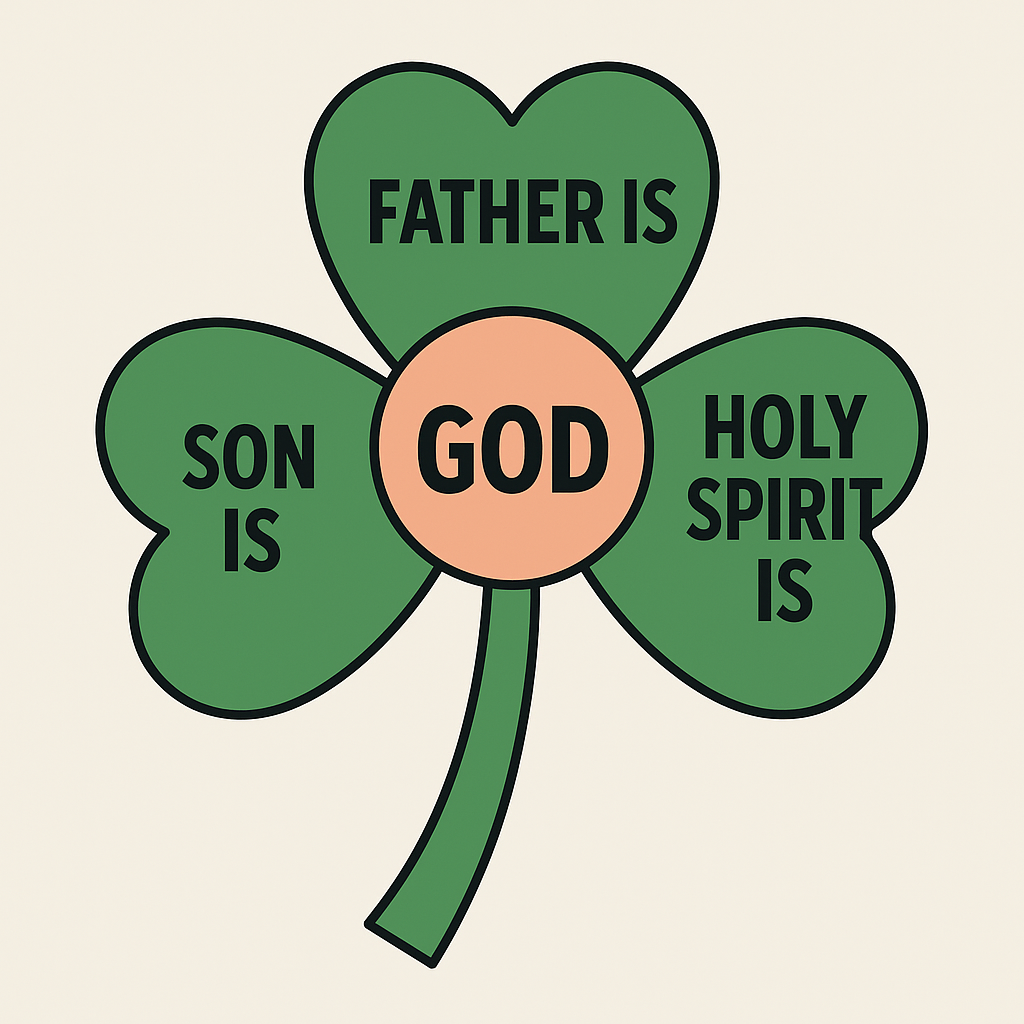How can we explain the Trinity? The doctrines of our faith can be both simple and complex. Sometimes being able to grasp them completely becomes a challenge, even if on the surface they appear simple. Salvation by faith in Christ is a relatively simple idea, yet many people fail to fully comprehend it and, in some cases, reject it. The Trinity can be a challenging concept to wrap our minds around, but it’s central to understanding who God is. Even if we conceptualize what it is, it is still challenging to grasp it fully. However, as you will see, that does not deny or diminish the truth of the triune nature of God.
A Brief Overview of the Trinity
The doctrine of the Trinity teaches that there is one God. This one God reveals himself in three persons.
We identify them as:
- God the Father
- God the Son (Jesus) and
- God the Holy Spirit.
This makes up what is known as the Godhead. Each member of the Godhead is co-equal, co-existent, and co-eternal. Here is where the complication of comprehension comes into play. There is one God, yet there is the distinction of three persons, but still there remains only one God.
From this unified nature of God, we get this word Trinity, which represents the tri-unity of God. The biggest question many have in trying to either figure out or challenge this doctrine is how can one be three and there still only be one? This is the mystery of the Godhead, and it is important to understand this is not a mystery created by man, but a truth revealed in scripture.
Biblical Foundations of the Trinity
If you search for the word Trinity in the Bible, you will not find it. This should not cause you any concern because there are other words we use to describe the character of God that are not specifically in scripture either. You won’t find the words omnipotent, omniscient, or omnipresent in the Bible, yet we know the Bible teaches us these things about God’s character or nature. The same is true of the Trinity. It is important to note that the teaching of the Trinity finds its foundations throughout Scripture, beginning from creation.
One of the first truths we learn from Scripture is that God created the heavens and the earth. However, if you look closer, you see the persons of the Trinity present right from the beginning.
"In the beginning God created the heavens and the earth. Now the earth was formless and empty, darkness was over the surface of the deep, and the Spirit of God was hovering over the waters" (Gen.1:1-2).
In these two verses in Genesis 1, there are two persons of the Trinity represented. You see God the Father and the Holy Spirit present during creation. The rest of Genesis tells us that God said let there be and there was. When we get into the New Testament, we discover another person was present during creation.
"In the beginning was the Word, and the Word was with God, and the Word was God. He was with God in the beginning. Through him all things were made; without him nothing was made that has been made" (John 1:1-3).
The Word, as mentioned here in John, is Jesus. Jesus is the Word that was with God and the Word that was God. Here is where we see equality and distinction in the Godhead. We also see that Jesus was present during creation and was responsible for creation in an equal manner to the Father. These representations in both Genesis and John point to the co-existent, co-equal, and co-eternal nature of God, which is a key principle to the teaching of the Trinity.
We see further reference to the members of the Trinity in both Matthew and Corinthians:
"Therefore go and make disciples of all nations, baptizing them in the name of the Father and of the Son and of the Holy Spirit" (Matt. 28:19).
"May the grace of the Lord Jesus Christ, and the love of God, and the fellowship of the Holy Spirit be with you all" (2 Corinthians 13:14).
Some Helpful Analogies for the Trinity

How do you explain something that goes beyond explaining? Well, in trying to help the human mind grasp the idea of the Trinity, Christians through the centuries have attempted to use various analogies. Here are a few:
1. The Shamrock (St. Patrick’s analogy)
Explanation: A shamrock has three leaves, yet it is one plant. In the same way, God is one being, yet three Persons: Father, Son, and Holy Spirit.
Strength: Simple, easy to picture, good for teaching children.
Limit: Risks implying that the Father, Son, and Spirit are only parts of God instead of each being fully God.
2. Water (three states: solid, liquid, vapor)
Explanation: Water can exist as ice, liquid, or steam, yet all are H₂O.
Strength: Shows the same essence expressed in different forms.
Limit: Can suggest modalism (the idea that God is one Person appearing in three modes at different times).
3. The Sun (star, light, and heat)
Explanation: The sun itself, the light it gives, and the heat we feel are distinct, yet inseparable.
Strength: Illustrates unity with distinct effects.
Limit: Risks suggesting that the Son and Spirit are just “emanations” or creations of the Father, not equally eternal and divine.
One challenge to the idea of the Trinity is that sometimes people will say that it doesn’t make sense. How can you believe in something you cannot totally understand or explain? On the surface, that may seem like a valid point until you realize there are many things in life we simply cannot explain but hold to be true.
Take, for example, gravity. While scientists may have a general idea of what it is, no one can tell you definitively how it works or why it works, yet we know it to be true. The same can be said of the Trinity or even other aspects of God’s character. For example, can you define how God’s love works or even why he loves you? Most people can’t, but we know he does, and we can accept the fact that he chooses to love us, even if we cannot totally understand his love. This is not just true of God’s love; this is true of love in general. You don’t need complete understanding of something or know every aspect about it for something to be true.
Why the Doctrine of the Trinity Matters
Here are two ways understanding the Trinity and how God works can be important in your Christian life. Start with your journey to salvation. The Holy Spirit convicts you of sin (John 16:8), which makes you aware of your sinful condition. The Holy Spirit then points you to Jesus (John 16:13-14), who was the perfect sacrifice necessary to pay the full penalty for your sin. By placing your faith in Jesus, you find forgiveness and cleansing of sin. This cleansing makes redemption back to the Father possible.
It also helps to understand the Trinity when you pray. We come to the Father, which is what Jesus taught us. We gain access to the Father through the shed blood of Jesus, which gives us the right to sit in his presence, and we pray by the power of the Holy Spirit. The Holy Spirit is there to help us pray. Even in prayer, we see the Godhead at work.
Will we ever have perfect understanding of the Trinity in this life? The answer is probably not. However, we can know that it is true, and there are numerous other places in Scripture that support this truth. You should know that every aspect of your Christian journey is affected by God the Father, God the Son, and God the Holy Spirit. Yes, there is only one God, and yes, he has revealed himself in three persons; that’s what the Scripture teaches us. While we may not fully comprehend now, we will have all eternity for God to unwind the boundless nature of his character.
"For now we see only a reflection as in a mirror; then we shall see face to face. Now I know in part; then I shall know fully, even as I am fully known" (1 Cor. 13:12).
For Further Reading
The Holy Trinity: Meaning of One God in Three Persons
What Should Christians Know about the Trinity?
What Christians Need to Understand about the Trinity
Photo credit: ©GettyImages/Chinnapong

He is the author of The Pursuit of Purpose, which helps readers understand how God leads them into his will, and the author of The Pursuit of Victory: How To Conquer Your Greatest Challenges and Win In Your Christian Life. Clarence is also committed to helping 10,000 people learn how to study the Bible and has released his first course, Bible Study Basics, to achieve that goal. To learn more about his ministry and resources, please visit clarencehaynes.com.



.jpg)

